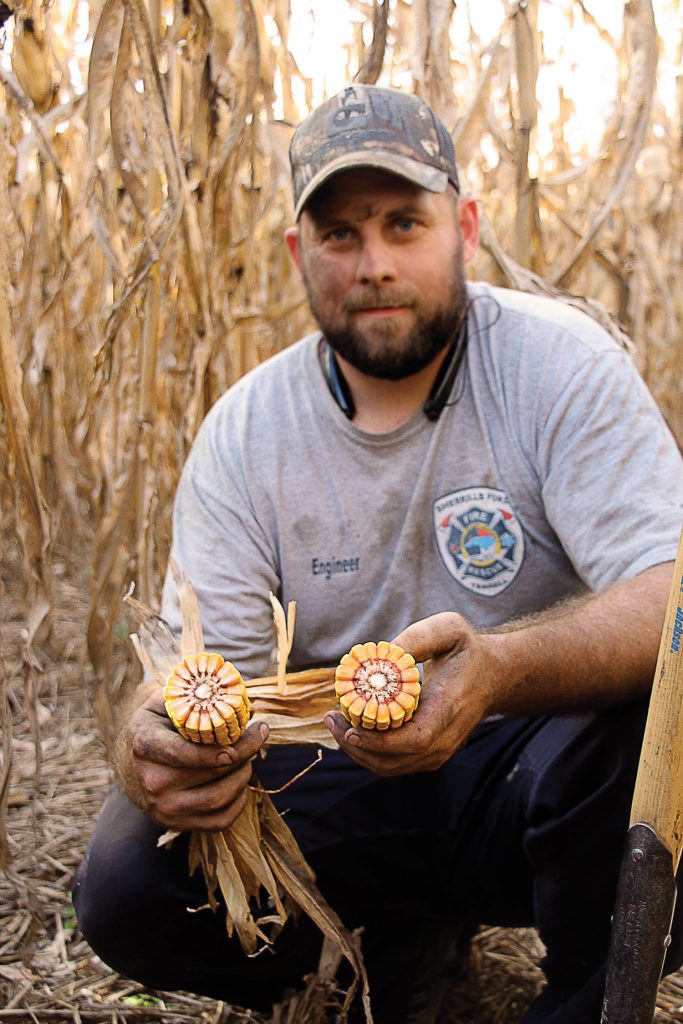
Farmer Russell Hedrick is building his soil and his legacy.
Russell Hedrick wasn’t born into farming — no one in his immediate family did it. And it’s not what he grew up dreaming about, either. Actually, he achieved his childhood ambition: becoming a full-time fireman.
But something kept tugging at him. Although his main job was at a mill, Hedrick’s grandfather also made hay and kept a couple of cows on the side. “That was my introduction to being out on the land,” remembers Hedrick. In 2012, after working extra hours and saving money, he quit his firefighting job, tapped into his inner Old MacDonald, and leased his first 30 acres of farmland — an area that’s grown 25 times that size.
The first-generation Catawba County farmer, who shares his dream with wife Tara and their three-year-old daughter Emmalyn, has learned new approaches that have helped the operation, JRH Grain Farms, become more environmentally friendly — as well as increasingly productive. Hedrick gleaned a lot of information from cover-crop innovator Gabe Brown of North Dakota, recently named one of the 25 most influential people in agriculture. Brown is a featured speaker at the Organic Growers School’s annual spring conference at UNCA, held March 10-12.
Brown and Hedrick will both appear at Living Web Farms in Mills River in a satellite event of the Organic Growers School. Meanwhile, Hedrick speaks to Bold Life about applying Brown’s methods in the Carolina foot-hills.
You wanted to be a fireman. Why the switch?
I like to gamble. Worst-case scenario is that failure was an option and I’d continue to be a fireman. I just wanted to say I gave farming a shot.
And now the land you farm is about 750 acres …
We’re really spread out. We’ve got about 23 landlords. It’s a lot of Christmas cards and thank-you notes.
What do you grow now, five years into your new career?
When I first got into farming, I just wanted to grow row crops, so we did corn the first year. Now we do corn, soybeans, wheat, barley, oats. We’ve integrated cow, sheep, and pigs into our operation.
How is what you do different than most farmers?
Really, we implemented cover crops as the first step and we didn’t even know what we were doing. It went from using cover crops to suppress weeds, and now we’re using them to scavenge nitrogen and build nitrogen. By utilizing certain practices, we are not only growing a better crop, but also we can cut back on herbicides: we use about 50-percent less herbicides than most guys would. We haven’t spread fungicide or insecticide in three years. I’m not saying [chemicals] are bad. I’m saying they are a tool for farmers that we have to use wisely.
Explain ‘cover crop’ to city dwellers …
It’s a crop that you plant in between your main cash crop. It’s really there to help build the soil back. You’ll hear Gabe talk about regenerative farming practices. We’re trying to rejuvenate the soil and bring it back to where it was before we degraded it.
How did you find out about this type of farming?
I went to my local NRCS [Natural Resources Conservation Service] office the first year I started farming. I had a district conservationist who was passionate about two things — cover crops and rotationally grazing animals. I met guys like [NRCS Conservation Agronomist] Ray Archuleta and Gabe Brown, who were great mentors. People who have a passion for soil are always willing to share that information and help beginning farmers.
How have you tailored Gabe’s methods to use in the South? Is there a difference between what he does in North Dakota and what you do in North Carolina?
It doesn’t matter where you go in the country, the principles of soil health are the same. What Gabe has done is to give younger farmers the confidence to try a new system that thinks outside the box of production agriculture.
“Treating the Farm as an Ecosystem” happens Friday, March 10, 9:30am-4:30pm, at Living Web Farms in Mills River (176 Kimzey Road), co-sponsored by the Organic Growers School. Gabe Brown headlines and Russell Hedrick will speak during the lunch portion of the program. For registration information, see livingwebfarms.org or organicgrow-erschool.org.
